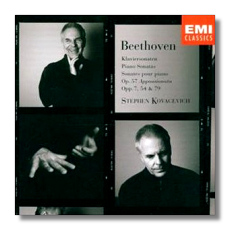
The Internet's Premier Classical Music Source
Related Links
- Beethoven Reviews
- Latest Reviews
- More Reviews
-
By Composer
-
Collections
DVD & Blu-ray
Books
Concert Reviews
Articles/Interviews
Software
Audio
Search Amazon
Recommended Links
Site News
 CD Review
CD Review
Ludwig van Beethoven

Piano Sonatas
- Piano Sonata #23 in F minor, Op. 57 "Appassionata"
- Piano Sonata #22 in E Major, Op. 54
- Piano Sonata #25 in G Major, Op. 79
- Piano Sonata #4 in E Flat Major, Op. 7
Stephen Kovacevich, piano
EMI 56965
What does it mean to mean? Is it just an average?
In the case of music, if not in all cases, I think it is better to ask "how" do things mean? As I listen to Kovacevich's latest installment in his Beethoven cycle this question comes to my mind. The word that most often came to mind over several listenings was "interesting". I mean that in the sense that his playing creates a sense of wonder and I want to learn more about the music, I want to listen to other interpretations. How does he accomplish this?
It so happens that I am also reading an essay about Bing Crosby. In it the author cites a 1899 article from "Popular Science Monthly". Talking about how white singers can sound "Negro" Robinson Murphy wrote, "around every prominent note [the singer] places a variety of small notes, called 'trimmings'." This is exactly the thing that Kovacevich does to the Beethoven Sonatas. The interplay between his hands, the phrasing produces brain synapses that are almost tactile in sensation.
As I said, I wanted to listen to other interpretations. For a modern comparison I listened to Alfred Brendel's recording of the Appassionata on Philips. It was not nearly as involving, as interesting. Listen to just the opening where Kovacevich emerges like some elemental force while Brendel merely is playing the music. Kovacevich seems to be exploring the music in search of some truth. These comments apply as well to the other pieces on this disc.
I could go on and on, but let's cut to the quick. (What is the etymology of that phrase?) Stephen Kovacevich is one of the two greatest living pianists. The other is Martha Argerich. Given that I feel this way about them, you may decide to disregard my review. If so, you will have missed a great recording.
I have listened to all of the previous releases in Kovacevich's cycle and praised them all. I know that Schnabel is held as a pinnacle and that Solomon is likewise highly regarded. I do not share the love of Schnabel and while I do like Solomon, Kovacevich is special. I really want to hear if he can unlock the Hammerklavier for me.
Post Script: As I listen to the Appassionata, Schubert comes to mind. I do not know the chronology of any compositions Schubert wrote at that time. While I do know that Beethoven influenced Schubert, I never before heard any Beethoven that sounded like Schubert.
The essay about Crosby was written by Gary Giddins and appeared in the 28 January 2001 issue of The New York Times.
After putting the finishing touches on this review I rewarded myself by just listening to the entire disc and not writing a single word.
Copyright © 2001, Robert Stumpf II


















